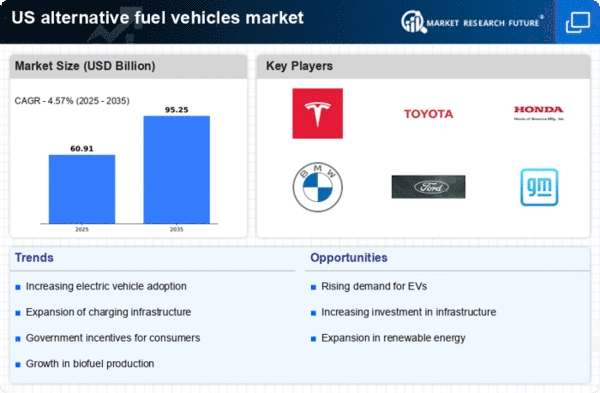Rising Environmental Awareness
Rising environmental awareness among consumers is a significant driver of the alternative fuel-vehicles market. As public concern about climate change and air quality intensifies, more individuals are seeking sustainable transportation options. Surveys indicate that over 60% of consumers in the US are willing to consider alternative fuel vehicles as a viable option, reflecting a shift in consumer preferences. This growing consciousness is further supported by educational campaigns and advocacy from environmental organizations, which emphasize the benefits of reducing carbon footprints. Consequently, the alternative fuel-vehicles market is expected to expand as manufacturers respond to this demand by offering a wider range of eco-friendly vehicles. This trend indicates a transformative shift in the automotive industry towards sustainability.
Government Incentives and Subsidies
The alternative fuel-vehicles market in the US is significantly influenced by government incentives and subsidies aimed at promoting cleaner transportation options. Federal and state governments have implemented various financial incentives, such as tax credits and rebates, to encourage consumers to purchase electric and alternative fuel vehicles. For instance, the federal tax credit can reach up to $7,500 for eligible electric vehicles, which has been a driving force in increasing sales. Additionally, states like California offer further incentives, enhancing the appeal of these vehicles. As of 2025, approximately 20% of new vehicle sales in the US are projected to be alternative fuel vehicles, largely due to these supportive policies. This trend indicates a robust commitment to reducing greenhouse gas emissions and fostering a sustainable automotive ecosystem.
Corporate Sustainability Initiatives
Corporate sustainability initiatives are increasingly influencing the alternative fuel-vehicles market as businesses strive to reduce their environmental impact. Many companies are adopting green fleets, transitioning to electric and alternative fuel vehicles to meet corporate social responsibility goals. This shift is not only beneficial for the environment but also enhances brand reputation and customer loyalty. As of 2025, it is estimated that over 30% of corporate fleets in the US will consist of alternative fuel vehicles, driven by both regulatory pressures and consumer expectations. This trend suggests that businesses recognize the importance of sustainable practices in maintaining competitiveness in a rapidly evolving market. The commitment to sustainability is likely to further propel the growth of the alternative fuel-vehicles market.
Urbanization and Changing Mobility Patterns
Urbanization and changing mobility patterns are reshaping the alternative fuel-vehicles market in the US. As urban populations grow, there is an increasing demand for efficient and sustainable transportation solutions. Cities are implementing policies to reduce traffic congestion and improve air quality, which often includes promoting the use of alternative fuel vehicles. For instance, many urban areas are establishing low-emission zones and offering incentives for electric vehicle use. By 2025, it is projected that urban areas will account for over 50% of alternative fuel vehicle sales, as consumers seek convenient and eco-friendly options for their daily commutes. This trend indicates a significant shift in transportation dynamics, emphasizing the need for innovative solutions in urban mobility.
Technological Advancements in Battery Technology
Technological advancements in battery technology are playing a crucial role in shaping the alternative fuel-vehicles market. Innovations in lithium-ion batteries, such as increased energy density and reduced charging times, are enhancing the performance and appeal of electric vehicles. As of 2025, the average range of electric vehicles has improved to over 300 miles on a single charge, addressing consumer concerns regarding range anxiety. Furthermore, the cost of battery production has decreased by nearly 80% over the past decade, making electric vehicles more affordable. These advancements not only boost consumer confidence but also contribute to a projected growth rate of 25% in the alternative fuel-vehicles market over the next five years. This dynamic landscape suggests a promising future for electric mobility.
















